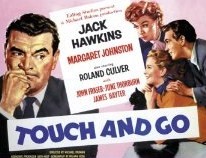Critical reception
The Monthly Film Bulletin wrote: "Although Touch and Go does not match the invention or wit of William Rose's earlier scripts ( Genevieve , The Maggie , etc.), the writer's flair for creating likeable characters is again apparent, and there is an agreeable touch of malicious humour in the handling of such characters as the father and mother-in-law. Unfortunately it is quite obvious, almost from the outset, that this particular family will never reach Australia (young lovers are rarely parted and animals never neglected in the British cinema), and this fact makes for a rather dead climax. Michael Truman (directing his first film) employs a gentle, unhurried style in keeping with the mood of the piece, but does not succeed in disguising the thinness of the material itself; and the young lovers suffer from the distressing coyness invariably associated with members of English screen and radio families. Jack Hawkins as the harassed father sometimes employs an over-emphatic technique, but his playing generally displays a pleasant comic sense. Margaret Johnston, in the under-written part of his wife, suffers nobly and wins through in the end. Altogether, a slight and insubstantial film, which, nevertheless, evokes a gentle and amiable mood." [5]
The Radio Times called the film "A depressing wallow in the sort of whimsy that Ealing foisted upon the world as British Realism." [2] Leonard Maltin was more positive, calling the film a "wry study". [6]
